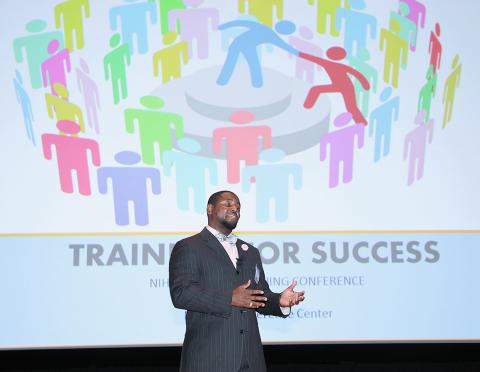Training Is Key to Building Winning Culture

Photo: Chia-Chi Charlie Chang
To create a winning culture, supervisors must communicate expectations, motivate others to do their jobs and believe their employees can succeed, said Sam Caldwell at the “Training for Success” NIH Employee Training Conference held recently in Bldg. 45.
“Unfortunately, most people don’t appreciate good leadership until they start experiencing bad leadership,” said Caldwell, athletic director and varsity girls basketball coach at New Hope Academy in Landover Hills, Md.
In 2005, he was hired to be head coach for the All-Navy basketball team. All-Navy teams are part of the Department of Defense’s sports program. Players compete in the Armed Forces sports championships against teams from the Marine Corps, Army, Air Force and Coast Guard.
The Navy team hadn’t won a championship since 1990, so Caldwell was under pressure to succeed right away. His supervisors thought his background as a former player positioned him for success.
Before he was hired, previous coaches would select 12 players on the basis of their applications. Caldwell knew he couldn’t identify winning players by reading about their qualifications. He held 5 regional, 2-day mini-camps so he could observe players’ work ethic, attitude and body language.
After the mini-camps, he invited 30 players to participate in a training camp. He then selected 12 players to be part of the team. From the previous year’s squad, he cut all but one player.
He hired an assistant coach with experience coaching in DoD’s sports program. The coach asked what Caldwell’s goal for the year was. He replied, “My goal for this year is to win a championship.” The coach began laughing so hard he almost fell out of his chair. He thought Caldwell didn’t select experienced players.
Caldwell fired him on the spot because the assistant believed the team couldn’t win. If coaches don’t believe they can win, players won’t believe they can win, either.

Photo: Chia-Chi Charlie Chang
“He couldn’t see that I wasn’t looking for playing experience. I was looking for attributes of winners—guys who had an opportunity to win something before, who would do anything to play at this level or who suffered an injury and were coming back and wanting an opportunity to play and compete at a high level,” Caldwell said.
He demanded a lot from his best players. He reasoned that if the best players put in the most effort, the other players would follow. That’s exactly what happened. The team, for example, began to show up to practice earlier than their coach. They went on to win the championship by 20 points.
In his current position as varsity girls’ basketball coach, Caldwell tells his players that “no one is going to work harder or have more fun than us.” He doesn’t hide that he wants to be the best. “Somebody has to be number one. Might as well be me,” he said.
He believes success is a process that can be repeated. “That’s why you can take a CEO and they can go anywhere and build an organization from the ground up. They can go and make a place better because they know what winning looks like,” he added.
The conference was hosted by the trans-NIH training conference committee. Attendees learned best practices and next practices in training activities and initiatives. The event also included a plenary session, breakout sessions and an exhibition of NIH training groups.

Photo: Chia-Chi Charlie Chang
